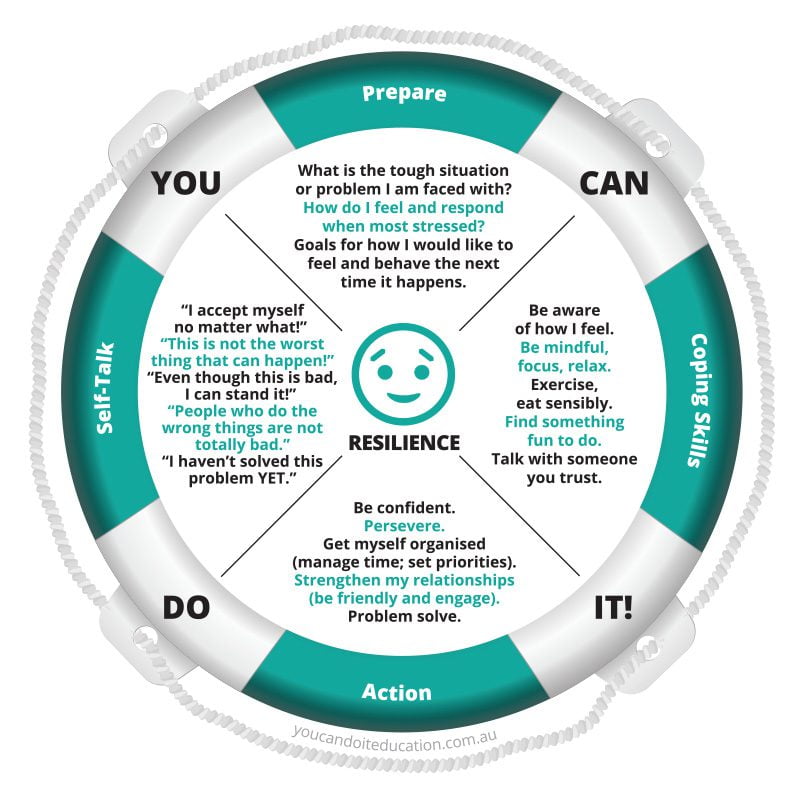The strength that helps protect us when faced with stressful events at home and work is RESILIENCE – a combination of thinking and social-emotional skills that help people of all ages manage their feelings and behaviour.
A resilient MINDSET towards stress can change the impact of stress. The degree to which someone holds the mindset that stress has positive consequences or horrible consequences impacts the individual’s performance, productivity, health and wellbeing.
As students, teachers, administrators, and parents prepare for the return of schooling, possibly including distance learning, we need to be aware a person’s resilience is what will help them cope emotionally, including managing their anxiety and being positive about today and tomorrow. We need to stimulate people’s awareness of the ABCs of resilience, including the power we all have to become more resilient needs to be a top priority.
Resilience is what protects all of us from the negative and painful feelings we can experience at these times – much like an umbrella protects us from the rain.
The good news is that everyone can be resilient.
What exactly is resilience?
Simply, it means being aware of how you feel, staying calm when you get very upset, managing your behaviour, so you don’t get too negative, calming down quickly and bouncing back.
When is it needed? Whenever you face difficulty. A difficulty might be dealing with changes at work, like a cutback in hours of employment, working from home, or becoming unemployed. Difficulties at home can be forced proximity with immediate family, lack of opportunities to meet with friends, oversight of children’s distance learning, relationship difficulties.
If we are fortunate not to have experienced much adversity in our lives, we may be unaware of how resilient we are. Only when we face significant threats, challenges or difficulties do we become aware of how sensitive we are to our surroundings and whether we have the inner quality of resilience that helps us cope and prosper.
Epictetus, a Stoic-Roman, wrote about the power of mindset some 2,000 years ago: “People are not affected by events, but by their view of events.“
The answer to the following question sheds light on the strength of someone’s resilient mindset:
“How good are you in being able to see the positive side of stressful events after your initial negative reaction?“
Today, due to being overwhelmed with stress, many of us are less able to respond positively to stressful events as we once were. Pandemic stress has forced its’ way into our lives, disrupting routines, relationships and the way we go about our business. In this instance, formerly resilient people need opportunities to rebuild and strengthen their resilience. When the amount of stress increases significantly, our amount of resilience diminishes.
We know that people’s mindset about stress, when negative, can be altered – to great benefit. It does not take long for people to experience a beneficial effect on their work performance and wellbeing when they learn to re-frame stress positively rather than negatively.
When faced with pandemic stress and the changes that have occurred at work (cutback in hours of employment, working from home, being laid off) and home (forced proximity with immediate family, lack of opportunities to meet with friends, oversight of children’s distance learning, relationship difficulties), it is essential for your emotional health and wellbeing to review the benefits of these changes. These can include more time to pursue hobbies, more time to develop stronger relationships with family members, a re-consideration of work opportunities post COVID-19 and more time to smell the roses.
Here are some simple things you can do to be resilient.
- Be aware of how upset you are.
- Consider the negative consequences of losing control of your emotions and allowing them to rule your behaviour – for the worse.
- It is OK to be upset (don’t beat yourself up). But also remind yourself of the power you have to manage your emotions and that being medium rather than extremely upset is an option and means you are still in control and capable of making good decisions.
- Do not blow the badness of events out of proportion.
- Remind yourself that while you might not like the way someone behaves, you can stand it.
- No matter their age, everyone is still learning how best to get along – everyone makes mistakes – everybody has issues that can lead to negative behaviour.
- Take a few slow, deep breaths to relax.
- If you have to, remove yourself from the situation until you are calmer.
- Discuss the problem with a sympathetic listener.
- Distract yourself by listening to music, taking a bath, or going for a walk.
- Don’t take things personally. And be proud of yourself – no matter what!
The Resilience Lifesaver
The Resilience Lifesaver summarises some of the things you can do to cope with feeling overwhelmed. Be sure to share this with your partner and kids.
 You can use The Resilient Lifesaver to help you stay afloat when facing stress at home or work. You’ll see the Lifesaver has four parts.
You can use The Resilient Lifesaver to help you stay afloat when facing stress at home or work. You’ll see the Lifesaver has four parts.
- Prepare means you are explicit on what event or person is stressing you out. You decide on the positive ways you’d like to feel and behave ahead of time. If possible!
- Self-Talk is the private conversations you have with yourself. The key here is to eliminate negative thinking and replace it with healthier, more positive thoughts.
- Coping skills are the little things you can do to keep yourself calm and composed.
- Action is the way you deal with the stressful event, solving the problem so that it reduces in size or disappears altogether.
Suppose you are getting stressed out by your kids. Suppose you want to be positive with them no matter how demanding they are. To do so, you will need to be very resilient, and the Resilient Lifesaver can help.
First, pick a specific situation where your child is doing your head in, and you are feeling out of control. Decide how you’d prefer reacting. Second, use self-talk to stay positive: “This isn’t the worst thing that could be happening. I can cope. This won’t last forever. I won’t take this personally“. Third, you decide to use relaxation breathing, plus have a chat with a friend to help you unwind, be patient and re-focus. Fourth, you do not give up! Instead, you figure out the best way to get your child to change their behaviour. Confidently, you put the plan into action – and persist and persist, including going to a different Plan B.
View our video that helps explain RESILIENCE.
Have a look and share with others at home and school: https://youcandoiteducation.com.au/resilience-video/
Resilience means being strong, positive and having self-belief. It’s not something you are born with. The good news is that we can all learn to be more resilient. The Resilience Lifesaver can help.






